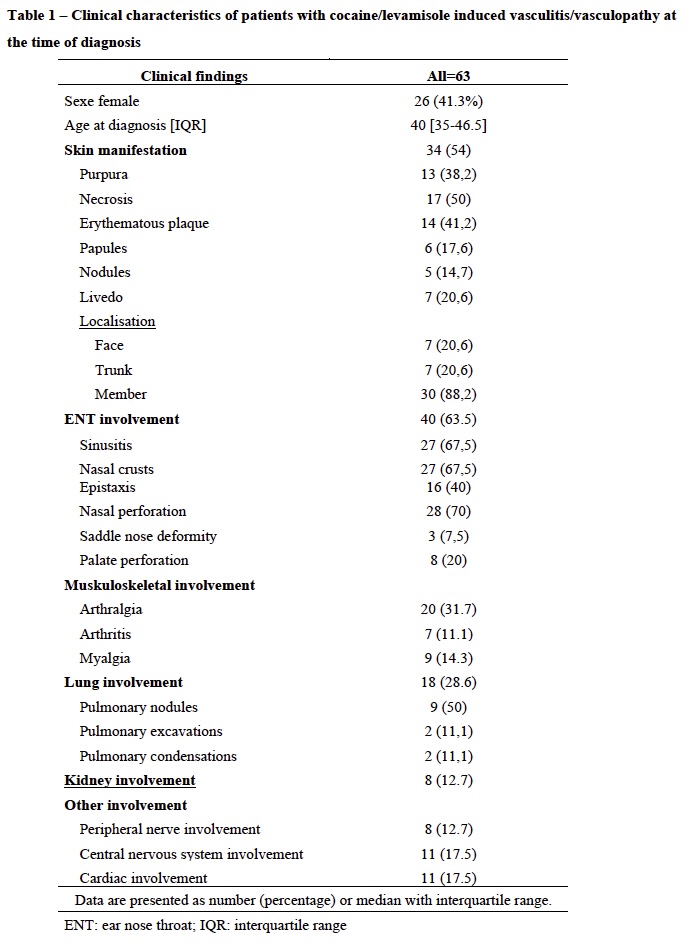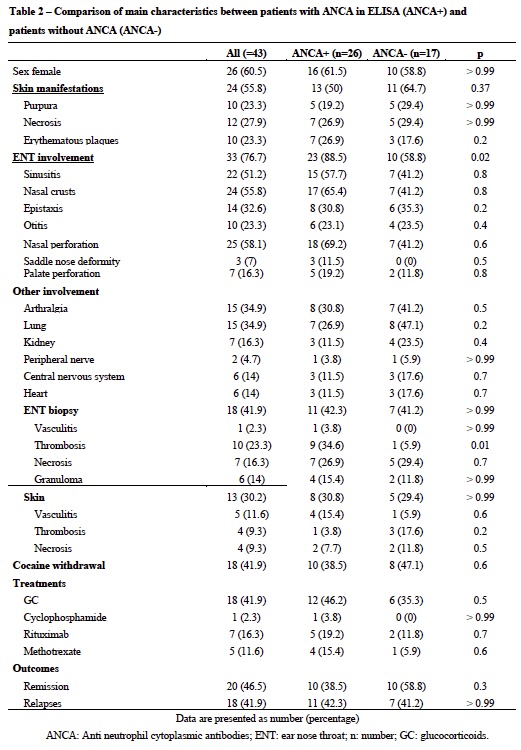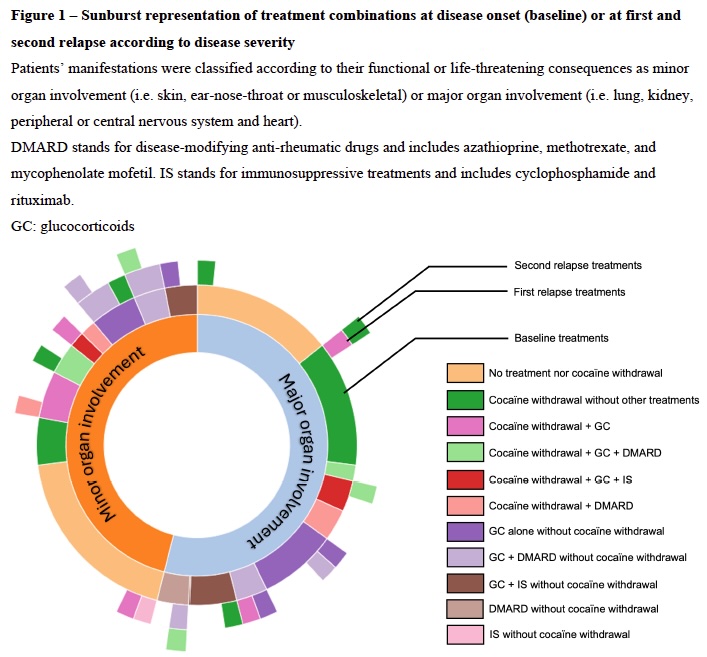Session Information
Date: Monday, November 18, 2024
Title: Vasculitis – Non-ANCA-Associated & Related Disorders Poster III
Session Type: Poster Session C
Session Time: 10:30AM-12:30PM
Background/Purpose: Levamisole, an imidazothiazole formerly used as an anthelmintic, is also used as a cutting agent to enhance the effects and duration of cocaine. In recent years, levamisole has been implicated in cases of vasculitis and/or thrombotic vasculopathy, particularly in the context of adulterated cocaine use. In addition, cocaine itself has significant vascular effects. We decided to describe a large series of patients with vasculopathy/vasculitis induced by levamisole and/or cocaine.
Methods: We conducted a retrospective multicenter observational study in France. Patients were recruited by a call for observations on behalf of the French Vasculitis Study Group (FVSG) and by screening data from toxicology laboratories.
Patients were included if they had 1) a documented or reported cocaine use regardless of the type of use and 2) vasculitis and/or vasculopathy symptoms after exclusion of other causes, ANCA positivity was not an exclusion criterion. We collected data using a standardized form, including age, sex, past medical history, clinical manifestations, biological and immunological characteristics, pathological data, treatment and outcome.
Results: A total of 63 patients were included, most of them male (58.7%), with a median age of 40 [35-47] years. The main characteristics of the patients are shown in Table 1. The main manifestations were skin (n=34, 54%) with purpura (n=13, 38.2%), necrosis (n=17, 50%) and erythematous plaques (n=14, 41.2%) mainly localized to the extremities, ear-nose and throat (ENT) symptoms (n=40, 63.5%) including sinusitis (n=27, 67.5%), nasal crusts (n=27, 67.5%), epistaxis (n=16, 40%) and saddle nasal deformity (n=28, 70%).
Patients with a positive ANCA test by ELISA (ANCA+) including 16 patients with PR3-ANCA, 3 with MPO-ANCA and 7 with both, were more likely to have ENT involvement than patients with a negative ANCA test (ANCA-) (Table 2). Of the 40 patients (63.5%) with histological results, ENT (n=20, 50%) and skin (n=18, 45%) were the preferred biopsy sites. Necrosis (n=13, 65%) and granuloma (n=6, 20%) were commonly described in ENT biopsies, whereas vasculitis (n=9, 50%) and thrombosis (n=6, 33%) were commonly identified in skin biopsies.
At disease onset, 24 patients (38.1%) were able to stop using cocaine. Of the 63 patients, 24 patients (38.1%) received glucocorticoids, 9 patients (14.3%) received methotrexate and 8 patients (12.7%) received rituximab. Treatment details and therapeutic sequences are summarized in Figure 1.
At the last follow-up, 37 patients (58.7%) were in remission and 7 (11.1%) had died. Twenty-four patients (38.1%) had relapsed. Patients who had been weaned from cocaine were more likely to be in remission (p< 0.0001) and had significantly fewer relapses (p=0.04) than other patients.
Conclusion: Cocaine/levamisole-induced vasculitis/vasculopathy frequently affects the skin (with a histological pattern of vasculitis and thrombosis) and ENT (with a histological pattern of necrosis). ANCA positivity does not appear to influence the clinical phenotype or the clinical course of the disease. Cocaine withdrawal significantly improves the prognosis of these patients.
Patients’ manifestations were classified according to their functional or life-threatening consequences as minor organ involvement (i.e. skin, ear-nose-throat or musculoskeletal) or major organ involvement (i.e. lung, kidney, peripheral or central nervous system and heart).
DMARD stands for disease-modifying anti-rheumatic drugs and includes azathioprine, methotrexate, and mycophenolate mofetil. IS stands for immunosuppressive treatments and includes cyclophosphamide and rituximab.
GC: glucocorticoids
To cite this abstract in AMA style:
Chevalier K, Chasset F, Zerbib Y, Jarrot P, Muller R, Pires T, Adavane S, Bessis D, Deroux A, Descamps V, Domont F, Faddoul J, gavand P, Goulenok T, Gramont B, Jachiet V, Leroux G, Mahevas M, Merindol J, Meudec L, Michaud M, Mourguet M, Munos pons H, Nguyen Y, Oules B, Papo T, Pouchot J, Rivière S, Robert O, ronsin C, Rossi B, Staumont-salle D, Terrier B, Tieule N, Olivier V, Wolkenstein P, Puéchal X, Bouaziz J, Dupin N, Peytavin G, Alvarez J, Mouthon L, Régent A. French Multicenter Retrospective Study of Patients with Cocaine- and/or Levamisole-induced Vasculitis and Vasculopathy [abstract]. Arthritis Rheumatol. 2024; 76 (suppl 9). https://acrabstracts.org/abstract/french-multicenter-retrospective-study-of-patients-with-cocaine-and-or-levamisole-induced-vasculitis-and-vasculopathy/. Accessed .« Back to ACR Convergence 2024
ACR Meeting Abstracts - https://acrabstracts.org/abstract/french-multicenter-retrospective-study-of-patients-with-cocaine-and-or-levamisole-induced-vasculitis-and-vasculopathy/



